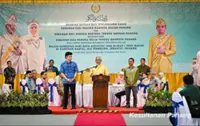
PUTRAJAYA: A list of individuals believed to be involved in the land encroachment case in Raub, Pahang, which includes government officials, is now with the Malaysian Anti-Corruption Commission (MACC).
“Yes, we already have a list. Considering the case dates back around 10 years or more, some of the officials involved have since retired,” said its chief commissioner, Tan Sri Azam Baki.
The MACC is not only focusing on governance issues but also examining how the land clearing activities could have occurred without action from the relevant authorities, he said after attending the South-East Asia Anti-Corruption Conference 2025: Recalling Jakarta Statement, yesterday.
Azam said the MACC had previously investigated a similar issue in 2021, with the inquiry nearly concluded at land office level.
The current investigation, however, involves a new wave of encroachment, which appears distinct from earlier cases.
“Some settlers claim they’ve been working the land since 1974. If that were true, the durian trees would be 40 to 50 years old, but we’ve also found trees that are only eight or nine years old, which clearly indicates recent encroachment,” he told Bernama.
Azam said all individuals or parties responsible will be called up.
Prior to this, an enforcement operation on durian farms in Raub sparked mixed reactions after farmers were unhappy over the destruction of their crops.
The Pahang government, however, denied allegations of breaching a court order when around 200 Musang King durian trees were felled during an operation in Sungai Klau, Raub, on April 8.
The operation, which involved police and the Pahang State Enforcement Unit (UPNP), was carried out in areas where land was cleared without permission.
It is expected to continue until May 3.
Meanwhile, Azam said it was not enough for anti-corruption bodies to be free from interference if they were not worthy of the people’s confidence.
He said institutional independence must go hand in hand with strong oversight and public accountability.
Azam also said Malaysia’s adoption of Article 36 of the United Nations Convention against Corruption (UNCAC), which calls for independent anti-corruption bodies, was guided by the Jakarta Statement on Principles for Anti-Corruption Agencies.
“At MACC, we have embraced these principles not only in form but in substance too,” he said in his speech at the conference.
Azam also said the MACC will adopt digital innovation, including artificial intelligence and blockchain technologies, to uncover hidden financial crimes.
Also present were Indonesia Corruption Eradication Commission (KPK) chief commissioner Setyo Budianto and representatives from Austria, Brunei, Cambodia, Indonesia, Laos, Myanmar, Singapore, Timor Leste, Mongolia, and Hong Kong.
Azam also called on governments to guarantee institutional autonomy, civil society to serve as partners in accountability and the private sector to uphold ethical practices.











































